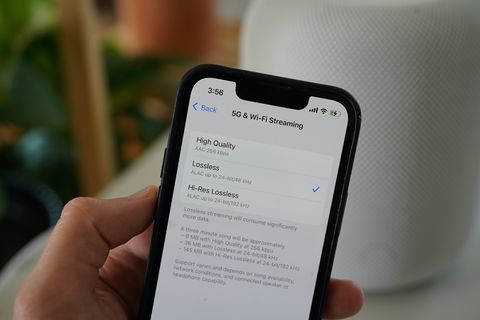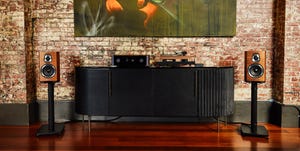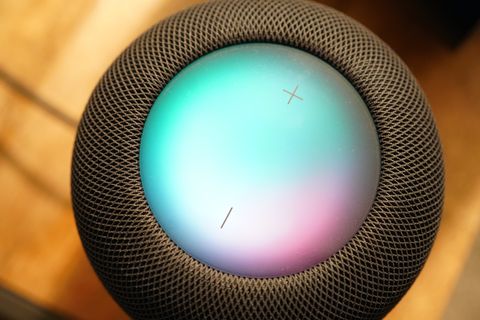It is official: we're in the age of lossless streaming. It's taken years and huge leaps in technology, but it's finally getting easier to listen to high-quality audio without taking out the record player or CD player. That's because the two biggest music streaming services, Apple Music and Spotify, have gotten in the mix — well, we're still waiting for Spotify to roll out its hi-fi service — and it's forced all the legacy lossless streaming services, like Tidal, Amazon, Qobuz and Deezer, to take notice.
-
 Apple Music Read More
Apple Music Read More -
 Tidal HiFi Read More
Tidal HiFi Read More -
 Amazon Music HD Read More
Amazon Music HD Read More -
 Deezer Premium Read More
Deezer Premium Read More -
 Qobuz Read More
Qobuz Read More
The other great thing that this competition has caused — it's more affordable to get lossless streaming. Since Apple has introduced a lossless tier to Apple Music at no extra cost (an Apple Music subscription is $10/month), it's forced the hands of other streaming services; Tidal, Amazon Music HD, Deezer and Qobuz all made their lossless streaming subscriptions cheaper.
If you're interested in upping your music subscription so that you can listen to CD-quality (or better) audio, we've rounded up the lossless streaming services that will allow you to do just that.
What Is Lossless Music?
The term "lossless" was essentially created to be a foil — or to mean the opposite — of "compressed" or "lossy," which are digital music files that have had a lot of their details — specifically their high and low frequencies — stripped away in order to save space on your smartphone or computer.
The term "lossless" doesn't mean uncompressed, however. It refers to a type of compressed digital audio file that uses advanced data compression algorithms so that the audio track doesn't "lose" any detail in the compression process.
For context, the average size of a compressed audio file, like a MP3 or a AAC, is about 1/4 the size of its original recording. The average size of a lossless compressed audio file, such as FLAC or ALAC (Apple Lossless), is now a little more than 1/2 the size of its original recording.
When somebody refers to a "lossless" track, they typically mean that it's the same quality as a CD or vinyl record (16-bit/44.1 kHz). This was the highest resolution audio that many lossless streaming services (like Tidal, Deezer and Qobuz) offered for years, but many of them now offer ever higher resolution audio files, which are also a type of lossless music.
For example, Tidal gives its HiFi subscribers the option of listening to Master Quality Authenticated (MQA) certified tracks (up to 24bit/96kHz), while Amazon Music HD gives its subscribers the ability to listen to "Ultra HD" (up to 24-bit/192kHz).
What to Look for
Max resolution: Every lossless streaming service is capable of streaming CD quality (16-bit/44.1 kHz) audio, but that's really the bare minimum requirement. A lot of lossless streaming services now offer significantly higher-resolution tracks that are Master Quality Authenticated (MQA, up to 24bit/96kHz) or "Ultra HD" (up to 24-bit/192kHz).
Max resolution (of your device): It's one thing to be able to have access to a lossless-quality track, but it's an entirely different thing to be able to listen to it. You need to make sure that your devices (be it a computer or smartphone as well as your headphones or speakers) can support those higher-resolution digital files. In order to properly listen to them, they need to be streamed over Wi-Fi or played over a wired connection. Bluetooth still doesn't support lossless streaming yet.
Catalog size: To be honest, most lossless streaming services now have a robust catalog of lossless tracks to stream — so it's not as much of a differentiating factor. However, most lossless streaming services don't have as robust of catalogs for even higher-resolution files like MQA and Ultra HD.
Downloads: It's best not to listen to lossless tracks when you're using a cellular connection because they consume a lot of data. This means that it's best to stream tracks while connected to Wi-Fi, but most streaming services allow you to download them for offline listening. Be wary that these tracks are going to take up quite a bit of storage space on your smartphone.
Price: When Apple released a lossless tier of Apple Music at no extra cost, it definitely disrupted the existing lossless streaming market. In fact, every one of them was forced to lower its base price from between $15 —$20 to around $10 (which is the cost of Apple Music). However, most lossless streaming services charge more than $10 for lossless streaming, that's higher than CD quality. These more premium plans also can great you access to more features, like live concerts and discounts if you want to purchase certain lossless tracks.
The 5 Best Lossless Music Streaming Services of 2023
Apple Music
- Number of lossless tracks: more than 75 million
- Max streaming quality: 24-bit / 192kHz
- Supported formats: AAC, ALAC
- Price: $11/month (one-month free trial for new users)
Apple Music has been a lossless streaming service since mid-2021, offering lossless quality tracks at the same $10/month as before. To make this lossless streaming possible, Apple introduced a new proprietary codec called ALAC (Apple Lossless Audio Codec), which starts streaming at CD quality (16bit / 44.1kHz) and this audio quality plays natively on all Apple devices, such as iPhones, iPads and Macs. You're capable of playing even higher-resolution audio files (up to 24-bit / 192 kHz) on Apple Music, as well, but you need to have an external DAC that supports it to experience them. Additionally, Apple Music supports spatial audio and Dolby Atmos tracks for listeners craving that more immersive experience.
Note: Apple increased the price of a monthly subscription to Apple Music from $10/month to $11/month in late 2022.
Tidal HiFi
- Number of lossless tracks: over 80 million
- Max streaming quality: 16-bit / 44.1kHz (Tidal HiFi); 24bit / 96kHz (Tidal HiFi Plus)
-
Supported formats: AAC, ALAC, FLAC
- Price: $10/month (one-month free trial for new subscribers)
As of November 2021, Tidal has split its subscription service into three different tiers. The's Tidal Free, an ad-supported service that plays way-less-than lossless tracks (up to 160kbps). There's Tidal HiFi, which costs $10/month and lets you listen to more than 80 million tracks in lossless CD quality sound (up to 1411kbps). And finally there's Tidal HiFi Plus, which costs $20/month and additionally lets you listen to Master Quality Authenticated (MQA) certified tracks (up to 24bit/96kHz) as well as audio tracks like 360 Reality Audio and Dolby Atmos Music. The big advantage to subscribing to Tidal HiFi and Tidal HiFi Plus is that you get access to artist exclusives, music videos and live concerts.
Amazon Music Unlimited
- Number of lossless tracks: over 100 million of “High Definition” tracks; millions of "Ultra HD" tracks
- Max streaming quality: 24-bit /192kHz
-
Supported formats: FLAC
- Price: $9/month for Prime members; $11/month for non-Prime members (one-month free trial for new subscribers)
Amazon launched its lossless streaming service in the fall of 2019, and it has two big selling points. First, it's affordable; it costs $9/month for Prime members. And secondly, it allows you to listen to really high-resolution audio. There are two different tiers of lossless audio to choose from. There are “High Definition” tracks, which are roughly CD quality; there are also "Ultra HD" tracks, which are 24-bit/192kHz and the highest-resolution audio that’s available for streamers.
Deezer Premium
- Number of lossless tracks: over 90 million tracks
- Max streaming quality: 16-bit / 44.1kHz
-
Supported formats: FLAC
- Price: $11/month (one month free)
Deezer is another excellent lossless streaming service that gives you the ability to play lossless CD-quality FLAC files. It has had to adjust its plans and pricing because of Apple Music, but the Deezer Premium plan is still the best option for audio lovers. The downside is that it doesn't support Master Quality Authenticated (MQA) tracks like Tidal's $20/month plan.
Qobuz
- Number of lossless tracks: over 80 million tracks
- Max streaming quality: 24-bit /192kHz
-
Supported formats: AIFF, ALAC, FLAC, WAV, WMA Lossless
- Price: $10.83/month (30-day free trial for new users)
Qobuz is one of the best lossless streaming services because of its intuitive app and large catalog of lossless and ultra-high-resolution tracks. (If you're looking for the best quality audio, Qobuz and Amazon Music HD are your two best options.) The only real downside of Qobuz is that it lacks some of the additional features — like auto-generated radio stations, a karaoke mode and music videos — that other lossless streaming services have.
Coming Soon: Spotify HiFi
- Number of lossless tracks: TBA
- Max streaming quality: TBA (but we're guessing 24-bit / 96kHz)
-
Supported formats: TBA
- Price: TBA
Spotify's first lossless streaming service, Spotify Hifi, was announced in February 2021 and it was supposed to launch before the start of 2022 — but it's midway through 2023 (as of this writing on June 21) and the lossless service is still not here yet. The reason for the delay is that, probably, Spotify is wondering how to price it; the release of Apple Music's lossless tier at $10 (now $11) really threw a wrench in Spotify's plans. If recent reports are to be believed, the upgraded service will most $19.99/month and come with more "premium" features, such as support for Dolby Atmos, podcasts with less (or shorter) advertisements and a headphone tuner. Of course, these will come in addition to a catalog of millions of "CD-quality" audio tracks.




































